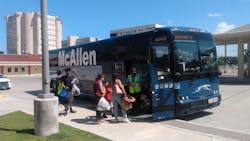DePaul Study: First-class intercity bus services shifts ground travel in new directions
According to a new DePaul University report, first class seating and service, which have long been part of commercial aviation, is becoming a focal point for post-pandemic intercity bus travel. Bus lines with premium offerings are changing the image of a sector long known for such legacy brands as Greyhound and Trailways. In the northeast, Texas and Virginia, new services debuting in 2021 feature amenities rarely seen on conventional buses, such as on-board attendants, generously reclining seats and snack and beverage service. New “co-sharing” arrangements in which bus and flight connections are sold on a single ticket could further change the face of long-distance bus travel.
“New business and first-class services are bright spots for an industry that has been devastated by the pandemic,” noted Joe Schwieterman, the DePaul professor and coauthor of “Routes to Recovery: 2022 Outlook for the Intercity Bus Industry. “Out of hard times has come a surprising burst of innovation.”
This includes the launch of The Jet, which rolled out a twice-daily premium service between New York’s Hudson Yards and Washington, D.C.’s Metro Center in November. With just 14 seats (in a 2-1 seating configuration) on its full-size coaches and an on-board attendant serving light snacks and alcoholic and non-alcoholic beverages, The Jet seeks to lure both Amtrak riders and frequent flyers. Unlike other first and business class offerings, The Jet offers the “HoverSeat,” a custom-designed seat equipped with Bose suspension technology, which is said to “block 90 percent of the bus ride’s bumps and movements.” Coupled with an improved air filtration system (reportedly like those used in ambulances) and enhanced WiFi, The Jet seeks to add new comforts to the ground-travel experience. Fares are typically between $99 and $149, less than half the cost of walk-up airfares and Amtrak’s Acela tickets.
Another new premium brand serving the Washington, D.C., area, Rapid Overland Express, relaunched its premium express service between Virginia Beach and Pentagon City, Va., in July, also with an onboard attendant. Passengers travel in deluxe coaches with 22 seats and enjoy catered meals during breakfast and lunch, served by an attendant. “ROX” offered four trips weekly after restarting service (which debuted in 2020), with trips four times weekly. ROX has also experimented with the Virginia Beach to Charlottesville, Va., route, which could return during peak season.
Last autumn, RedCoach, which has long had premium offerings in Florida, began first- and business-class service in the Texas Triangle, linking Austin, Dallas and Houston, with en-route stops in Waco and College Station. Its first-class coaches have just 27 seats and its business-class coaches have 38, giving customers more space than the 50-plus seats offered by many conventional services. Its custom seating offers spacious legroom and bed-like seats that recline up to 140 degrees (50 degrees from a vertical position). Customers also enjoy complimentary snacks. RedCoach operates from a curbside location next to the Hutchison Convention Center in downtown Dallas.
Less luxurious but also newsworthy is a major expansion by Landline, which seeks to shift travelers away from uneconomical short-hop flights and onto motor coaches. Landline forged a partnership with United Airlines last year that allows for through-ticketing via Denver International Airport (DIA). The service includes four daily buses in each direction from DIA to the regional airport in Fort Collins, Colo., and a daily roundtrip from Breckenridge, Colo. Customers can book tickets that involve connections between coaches and flights both on the airline’s website and other airline-ticketing platforms. Schwieterman considers this concept a “game changer” for the U.S. travel market, which has been slow to enhance intermodal connections.
The Landline/United partnership affords travelers protected connections, so if a bus or flight is late, the passenger will be accommodated in the same way as those missing flight connections. Passengers board coaches leaving DIA from a gate behind (airside) security, much like those catching other flights, whereas those arriving at DIA are dropped off on the groundside and must pass through security. Landline also has a sizeable operation at Minneapolis-St. Paul Airport in partnership with Sun Country Airlines.
The expanding network of premium bus operators includes the return of business-class services available before the pandemic, including Vamoose Gold and Tripper Elite in the Northeast Corridor and Vonlane in Texas (as well as on its relatively new Dallas – Oklahoma City route). C&J Bus Lines, Concord Coach and Dartmouth Coach have restarted their business-class service between Northern New England and New York, which features extra legroom and onboard snacks.
Such expansion raises an important question: Will the big players like Greyhound, FlixBus and Megabus get in on the action by creating premium services of their own? Megabus appears content, at least for the moment, pushing non-luxury-related perks, although Allison Woodward, a co-author of the study, notes that its “reserved seating and a sophisticated bus-tracker add to the alure of its service.” Fast-growing FlixBus tested a premium service on the Los Angeles to Las Vegas route last year marketed as “FlixPlus” that features extra legroom and complimentary snack and beverage service served by an attendant. Whether FlixBus will permanently move into premium service remains unseen.
The study team expects more service rollouts this year.
“There are still no regularly available premium services within California, in the Midwest, Pacific Northwest or between downtown Boston and New York,” noted Schwieterman, who considers such markets “ripe for the picking.”
Travel on intercity buses is projected to continue sharply rebounding through 2023, therefore he expects the bus sector’s innovative spirit to continue. The Chaddick Institute will host a free one-hour webinar on the study at noon CT on Thursday, April 14, 2022. The sign up or reach the study team, email [email protected].
